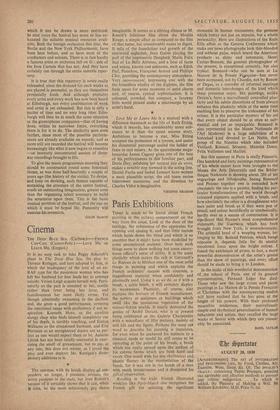Cinema
THE DEEP BLUE SEA. (Carlton.)—FRENCH CAN-CAN. (Cameo-Poly.)—Love ME OR LEAVE ME. (Empire.) IT is no easy task to take Peggy Ashcroft's place in The Deep Blue Sea, the play by Terence Rattigan, and here adapted by him, in which the inadequacy of the love of an ex- RAF type for the passionate woman who has left her husband for him leads her to attempt suicide. Vivien Leigh acquits herself well. Parti- cularly as the part is unsuited to her, coolth rather than fever being her forte, and fastidiousness her most likely virtue. Yet, though admittedly swimming in the shallow end, she gives a good performance, covering the emotional range with proficiency if not in- spiration. Kenneth More, as the carefree slangy chap who finds himself completely out of his depth, is terribly touching, and Emlyn Williams as the abandoned husband, and Eric Portman as an unregistered doctor are as per- fect as one would expect them to be. Anatole Litvak has not been totally successful in exor- cising the smell of greasepaint, but to me, at any rate, this does not matter, as I loved the play and even deplore Mr. Rattigan's diver- sionary additions to it.
The can-can, with its lavish display •of sus- penders, no longer, I presume, arouses the worst passions in the male, but Jean Rcnoir's version of it certainly shows that it can, when It tries, be the most infectiously gay dance
imaginable. It comes as a stirring climax to M. Renoir's felicitous film about the Moulin Rouge, a simple affair as compared to the film of that name, but considerably easier to digest. It tells of the foundation and growth of the renowned nightclub, Jean Cabin playing the pail of theimpressario Danglard, -Maria Felix that of La Belle Abbesse, and a host of faces and voices, known and unknown, such as Edith Piaf, Patachou, Francoisc Arnoul and Phillipe Clay, providing the contemporary atmosphere. Very mouvetnente, impressing one with the the boundless vitality of the Eighties, the film finds space for some moments of quiet charm and, of course, cynical sophistication. It is coloured, crowded, but compact, a faraway little world pinned under a microscope by an artist's hand.
Love Me or Leave Me is a musical with a difference inasmuch as the life of Ruth Etting, which it records, has considerably more sub- stance to it than the usual success story. Ambitious to become a star, Miss Etting accepted the protection of a tycoon, and under his dictatorial patronage scaled the ladder of fame in real misery. As the quarrelsome mega- lomaniac James Cagney gives one of the best of his performances in this familiar part, and Doris Day, subduing Irr natural joie de vivre, makes a notable step forward in the acting line. Daniel Fuchs and Isobel Lennart have written a most plausible script, the old tunes revive bittersweet memories, and the direction by Charles Vidor is imaginative.
VIRGINIA GRAHAM


































 Previous page
Previous page